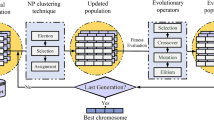Abstract
The machine learning community has traditionally used the correct classification rate or accuracy to measure the performance of a classifier, generally avoiding the presentation of the sensitivities (i.e. the classification level of each class) in the results, especially in problems with more than two classes. Evolutionary Algorithms (EAs) are powerful global optimization techniques but they are very poor in terms of convergence performance. Consequently, they are frequently combined with Local Search (LS) algorithms that can converge in a few iterations. This paper proposes a new method for hybridizing EAs and LS techniques in a classification context, based on a clustering method that applies the k-means algorithm in the sensitivity space, obtaining groups of individuals that perform similarly for the different classes. Then, a representative of each group is selected and it is improved by a LS procedure. This method is applied in specific stages of the evolutionary process and we consider the minimun sensitivity and the accuracy as the evaluation measures. The proposed method is found to obtain classifiers with a better accuracy for each class than the application of the LS over the best individual of the population.
Preview
Unable to display preview. Download preview PDF.
Similar content being viewed by others
References
Asuncion, A., Newman, D.J.: UCI machine learning repository (2007)
Back, T.: Evolutionary Algorithms in Theory and Practice. Oxford (1996)
Freeman, J.A.S., Saad, D.: Learning and generalization in radial basis function networks. Neural Computation 7(5), 1000–1020 (1995)
Fukunaga, K.: Introduction to Statistical Pattern Recognition, 2nd edn. Academic Press, London (1999)
Hwang, Y.S., Bang, S.Y.: An efficient method lo construct radial basis function neural network classifier. Neural Networks 10(8), 1495–1503 (1997)
Igel, C., Hüsken, M.: Empirical evaluation of the improved rprop learning algorithms. Neurocomputing 50(6), 105–123 (2003)
Martinez-Estudillo, A.C., Hervas-Martínez, C., Martinez-Estudillo, F.J., Garcia-Pedrajas, N.: Hybridization of evolutionary algorithms and local search by means of a clustering method. IEEE Transactions on Systems, Man and Cybernetics, Part B: Cybernetics 36(3), 534–545 (2006)
Martínez-Estudillo, F.J., Hervás-Martínez, C., Gutiérrez, P.A., Martínez-Estudillo, A.C.: Evolutionary product-unit neural networks classifiers. Neurocomputing 72(1-2), 548–561 (2008)
Orr, M.J.L.: Regularisation in the selection of radial basis function centres. Neural Computation 7(3), 606–623 (1995)
Parras-Gutierrez, E., del Jesus, M.J., Merelo, J.J., Rivas, V.M.: A symbiotic CHC co-evolutionary algorithm for automatic RBF neural networks design. In: Advances in Soft Computing, vol. 50, pp. 663–671 (2009)
Provost, F., Fawcett, T.: Robust classification system for imprecise environments. In: Proccedings of the Fithteenth National Conference on Artificial Intelligence, pp. 706–713 (1998)
Wilcoxon, F.: Individual comparisons by ranking methods. Biometrics 1, 80–83 (1945)
Yang, Z.R.: A novel radial basis function neural network for discriminant analysis. IEEE Transactions on Neural Networks 17(3), 604–612 (2006)
Author information
Authors and Affiliations
Editor information
Editors and Affiliations
Rights and permissions
Copyright information
© 2009 Springer-Verlag Berlin Heidelberg
About this paper
Cite this paper
Fernández-Navarro, F., Gutiérrez, P.A., Hervás-Martínez, C., Fernández, J.C. (2009). A Sensitivity Clustering Method for Hybrid Evolutionary Algorithms. In: Mira, J., Ferrández, J.M., Álvarez, J.R., de la Paz, F., Toledo, F.J. (eds) Methods and Models in Artificial and Natural Computation. A Homage to Professor Mira’s Scientific Legacy. IWINAC 2009. Lecture Notes in Computer Science, vol 5601. Springer, Berlin, Heidelberg. https://doi.org/10.1007/978-3-642-02264-7_26
Download citation
DOI: https://doi.org/10.1007/978-3-642-02264-7_26
Publisher Name: Springer, Berlin, Heidelberg
Print ISBN: 978-3-642-02263-0
Online ISBN: 978-3-642-02264-7
eBook Packages: Computer ScienceComputer Science (R0)




